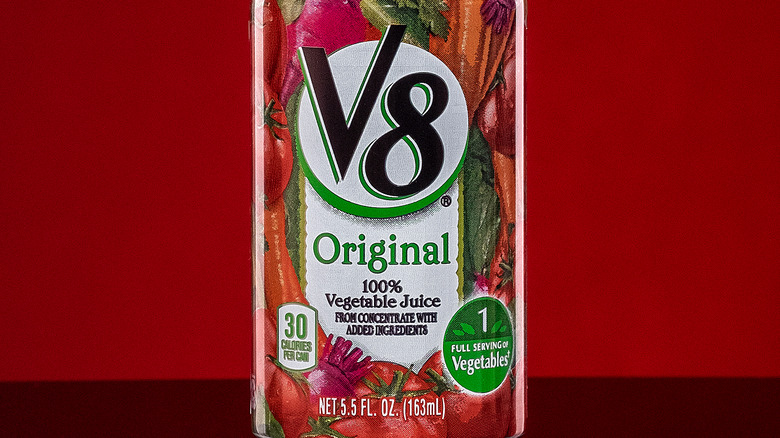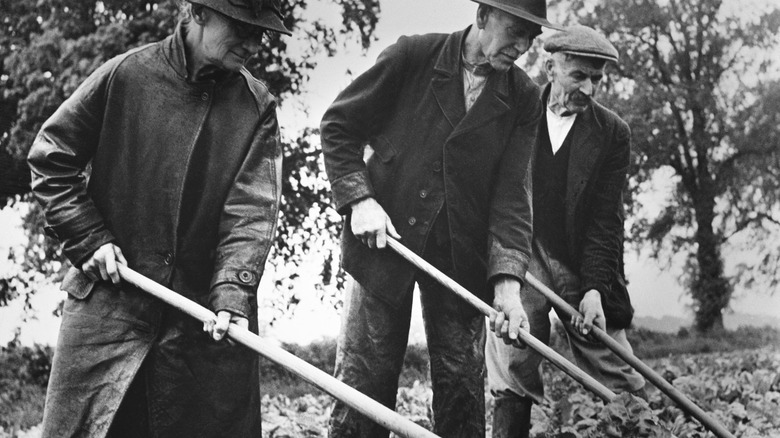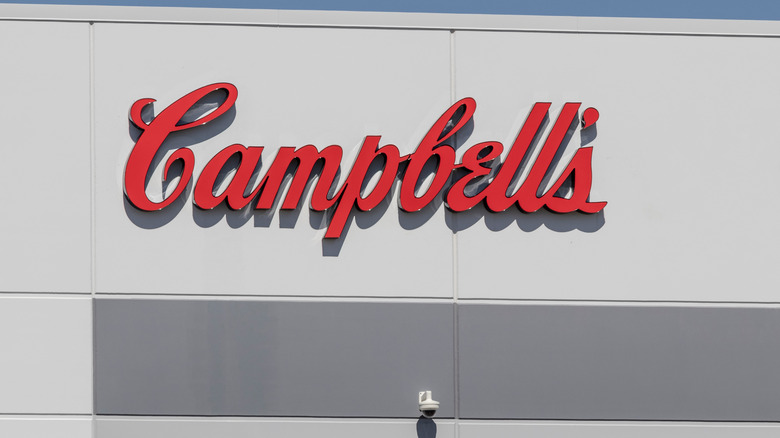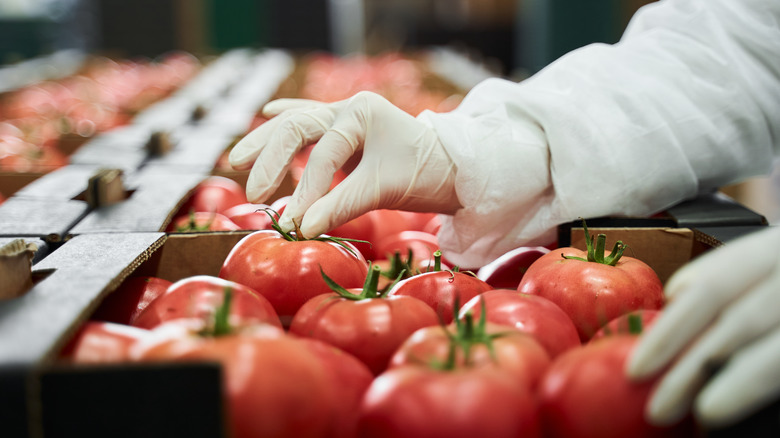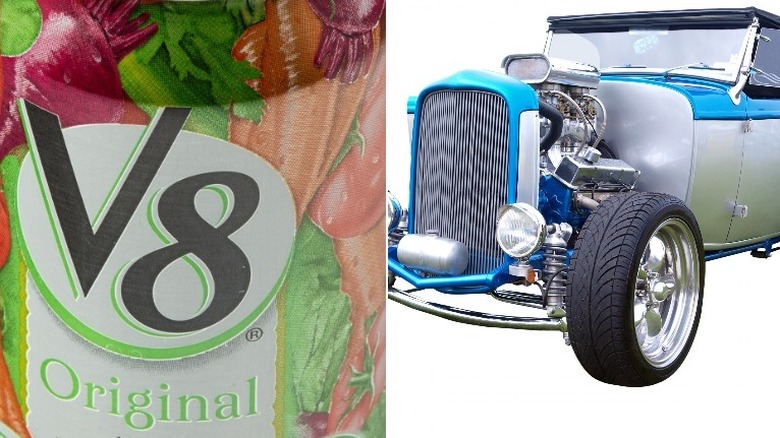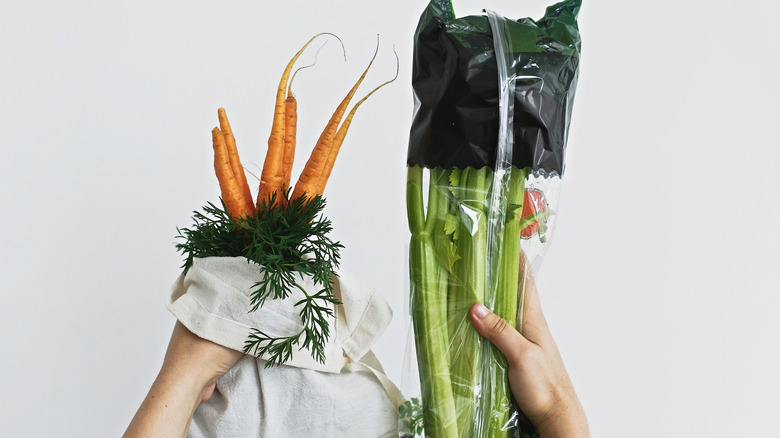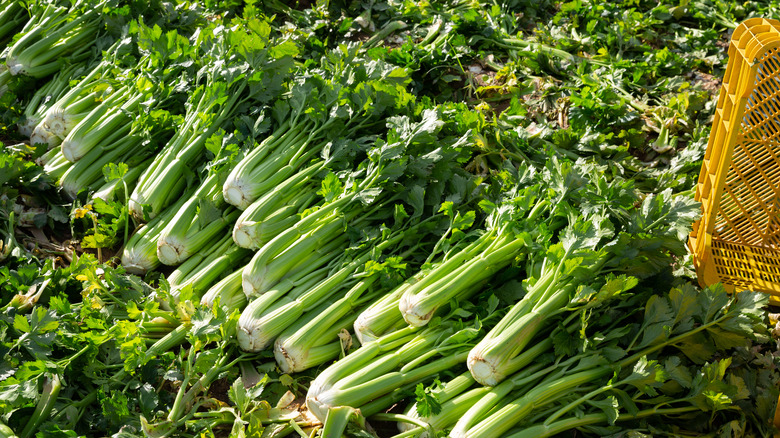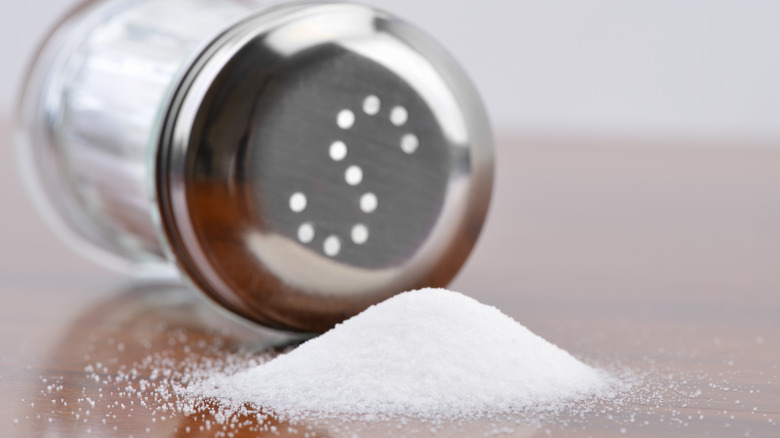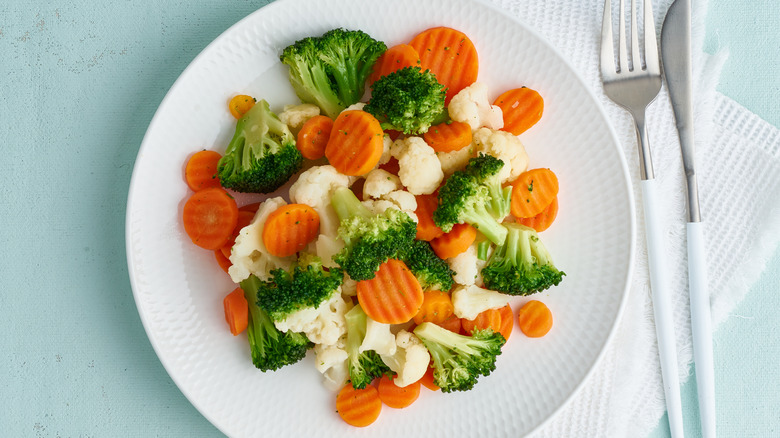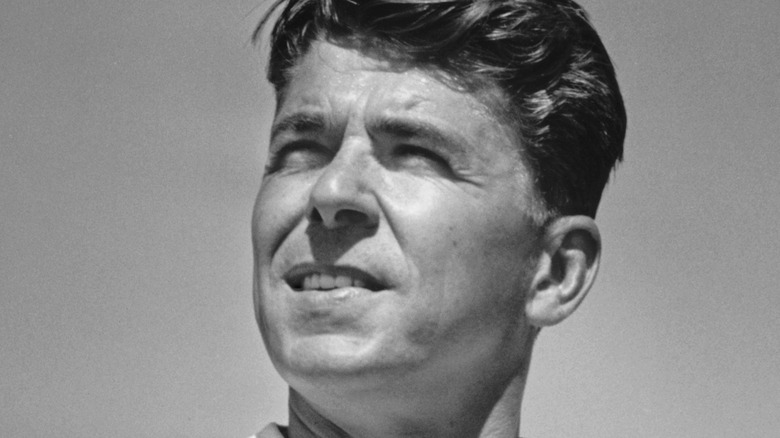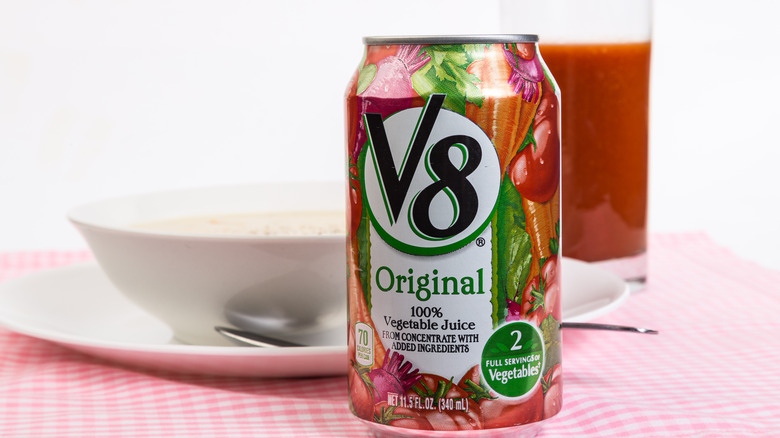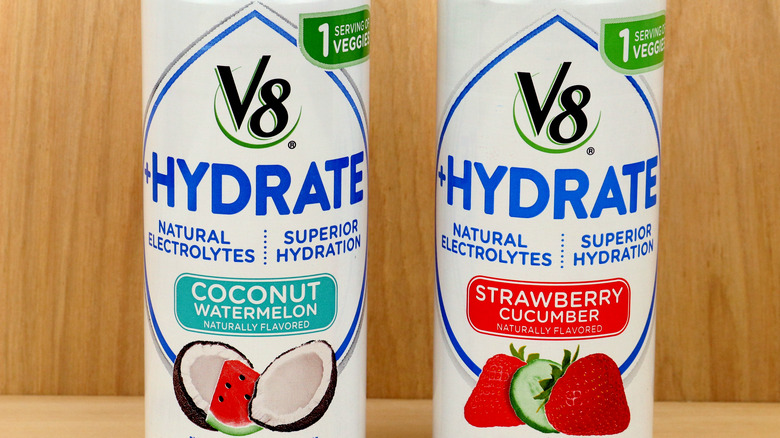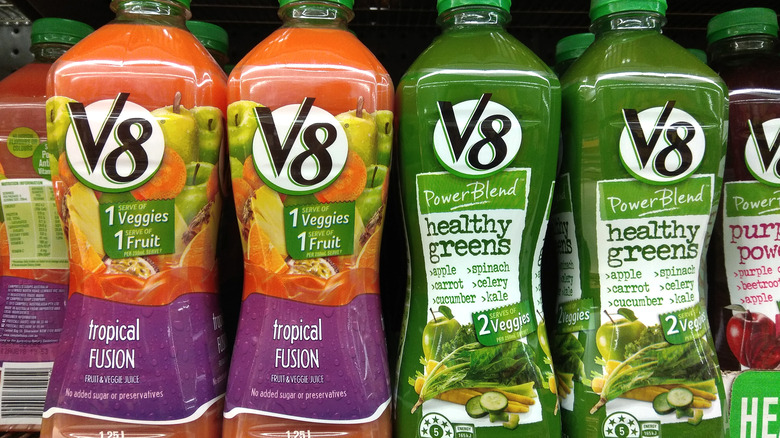The Untold Truth Of V8
V8 Vegetable Juice — otherwise simply known as V8 — is known for its inclusion of tomato plus seven healthy veggies in drinkable form. However, this seemingly healthy beverage is one that people seem to love or hate; there's simply no in-between. And if tomato juice isn't your thing, there's a good chance that V8 won't be either.
Unless you opt for one of the other several varieties that Campbell's, V8's parent company, has added to its repertoire throughout its existence. V8 now offers everything from fruit juice blends to energy shots mixed with juice, extending its reach to just about every demographic.
And whether you love V8 or not, one thing is for sure: this brand has a pretty interesting history and evolution that you probably never knew about (like a future president once promoting it — say what?). Today, the recognizable drink graces the shelves of almost every grocery store, but here's the story of how it became somewhat of a cult classic brand in the grocery world.
It has a long (and interesting) history
V8 Vegetable Juice dates back all the way to 1933, when William Gilbert Peacock and his son wanted a sustainable way to make sure they and others could get essential foods and nutrients during the Great Depression. The pair began hand-blending an assortment of vegetables together in their basement to see what they could create, and a veggie-based drink was born. Peacock enlisted the help of Frank Constable to manufacture the drink for Peacock's company, New England Products Company.
The war-driven era led to poverty for many, and Peacock's vegetable juice became a hit with families who had little to spend on food. Eventually, World War II rations began affecting families even more, and the government encouraged Americans to start gardens of their own to feed their households. Peacock's veggie juice quickly became a staple in pantries across the country because it included ingredients families relied on for daily nutrition. In 1947, as the drink grew in popularity, Constable reconfigured its recipe to include the vegetables it uses today and remarketed it to give it a chance at a successful future (via V8).
Its name has a unique history, too
V8 Vegetable Juice — although a seemingly perfect name for the veggie-based drink — hasn't always been called by the name. In fact, when William G. Peacock and Frank Constable first began manufacturing and marketing the product, they called it Vege-min. At the time, tomato made up the overwhelming majority of the drink, so V8 wouldn't have made much sense. It wasn't until 1948 when the Campbell Soup Company took over the drink brand that its name officially became V8 Vegetable Juice, or V8 for short.
Prior to the name change and Campbell's takeover, Frank Constable cycled through a few other names that he thought were a good fit for V8. First was Vege-min 8 after he came up with the new recipe including tomato and seven other vegetables. Later, Constable decided to go with V8 Vegetable Cocktail Juice, a more similar moniker to today's brand name. Constable thought the name V8 made sense because the drink was popular and powerful, like a vehicle's V8 engine (per V8).
Its formula has evolved through the years
Back when William Gilbert Peacock and his son experimented with the original V8 formula in their basement, the drink was almost solely made of tomatoes. To be exact, 87% of the recipe was tomato. During the Great Depression, tomatoes were a garden staple for many farmers because of their hardiness and ability to grow quickly. Depression-era families turned to canning their own tomatoes or turning them into soups to hang onto their produce as long as possible. Peacock took advantage of the fast-producing crop to transform it into a drinkable version that gave kids and adults an easy, affordable way to get their nutrients.
However, he and Constable knew that the formula would need to evolve to make it more popular with more people. At first, Peacock added beets and leafy greens for nutrition's sake, but the taste was underwhelming, at best. Eventually, they landed on a blend of veggies that produced a pleasant and complimentary taste, thanks to their flavor and organic sweetness.
V8 may have rolled through your town
If your parents or grandparents once told you a story of seeing a cute little roadster inspired by a V8 can driving through their town, think again before writing them off as memory-impaired. They're probably telling you the truth; the V8 Roadster was an actual vehicle that first made its public appearance on the "Tonight Show with Johnny Carson" in 1970.
The creator of the car, George Barris, had his own custom vehicle shop, Kustom Industries, and was responsible for designing and making the first-ever Batmobile in just three weeks (via Motortrend). However, the V8 Roadster was much less dark and slick and much more pop-art and fun, featuring a completely steel body covered in a label design reminiscent of a can of V8.
According to Bonhams, the custom car used a Ford 302 V-8 engine and dual fuel tanks — one to hold V8 juice, of course. The Roadster toured all over the country over the next few years as a unique marketing tool for Campbell Soup Company, eventually getting sold to a car museum keeper in 1973.
A lot goes into a can of V8
The original V8 was based mostly on tomatoes, but not long after its inception, the drink formula expanded to include seven more vegetables that became part of the staple list of eight primary ingredients — hence the name V8. Campbell's lists the primary veggies as orange and purple carrots, beets, spinach, sweet potatoes, watercress, and celery. Additionally, the brand emphasizes that "many more unique vegetables are used to create amazingly tasty drinks!"
Of course, like many plant-based food and drink products on the market, it's not just vegetables that go into a can of V8. Other supportive ingredients include Vitamins C and A, salt (or potassium chloride in low-sodium versions), citric acid, and natural flavors. Other versions of V8, like its vegetable and fruit blend juices and energy and hydration drinks, also contain various fruits, like blueberries, mangoes, and pomegranates.
One thing Campbell's doesn't add to its V8 vegetable drinks? Sugar. According to Frances Stern Dietetic Intern Caitlin Wong, "The important thing to note about V8 Juice is that it is 100% juice with no added sugars. The 8 grams of sugar that are in every serving of V8 occur naturally in the vegetables." While more than half the calories of a serving of V8 juice come from these natural sugars, Wong says that it also contains a good amount of beneficial fiber, protein, and vitamins.
V8's celery farming dates back 70+ years
Of its eight primary ingredients, V8's celery potentially has the longest and most interesting history. Over 70 years of history, to be precise.
A Campbell's article explains the story. Back in 1880, Jake Willbrandt's family started growing celery on a three-acre farm. Jake now owns the farm, which has expanded to 110 acres and added sweet corn to its specialties. Jake's great-grandfather began growing the celery used in the original V8 drinks since their inception in the 1940s and continued supplying the Campbell Soup Company with celery for V8 once the brand took over.
The farm's celery growing begins in February each year in greenhouses, moving into fields starting in mid-April. Production yields about 9 million pounds of the crop annually, with a hefty portion going straight into V8 cans across the nation. According to Willbrandt, "We hand-cut 95 percent of the harvest, and the trimmings...are put aside for V8. It gives you a lot of pride to grow a quality product. I love the freedom to have my family here, too. My kids work on the transplanters, and they take pride in what they've done." Willbrandt adds that, although his kids dislike veggies, V8 juice is a daily staple in their household.
It's not the healthiest drink in the fridge
So, is V8 juice actually good for you? Despite its usage of healthy vegetables and its reputation as a health-focused drink, V8 may not be as good for you as you think. According to nutritionist Annette Washington, V8 is better than a lot of other drinks you might decide to grab, like a sugar-laden iced coffee. However, says Washington, "The problem with V8 is that when you juice fruits and vegetables, you are losing some of the 'good stuff' like fiber, and with bottled juices, you end up getting extra things like added sugars and sodium."
And sodium is definitely an issue for the original V8 drink. One 8-ounce serving of V8 original contains 640 milligrams of salt. That's close to 28% of the recommended maximum intake of salt per day (per Medical News Today). The FDA warns that excessive salt intake can lead to high blood pressure, which can increase the risk of heart disease and stroke.
Fortunately, V8 has added a low-sodium version of its popular drink to its lineup, which has two-thirds less sodium than the original formula, at just 140 mg per serving. And, the low-sodium drink keeps the same amount of all the other good stuff in tact, like Vitamin A and Vitamin C.
It's best for supplementing, not replacing
Drinking a can of V8 can be a good way to make sure you hit your daily servings of vegetables, but some experts agree that it shouldn't be the only way you do it. According to the National Center for Health Research, eating fruits and veggies is usually the better option. Scientific evidence doesn't tend to prove that drinking vegetables provides the same health benefits as eating them. Additionally, it's not good to use vegetable juices like V8 as meal replacements to lose weight, as it doesn't give our bodies the balanced nutrients we need.
However, drinks like V8 can be used as part of a healthy diet. Registered dietician Katherine Zeratsky explains to the Mayo Clinic that "Vegetable juice can be an easy way to increase the amount of vegetables in your diet, but you shouldn't routinely use it to replace whole vegetables." While the recommendation for most adults is 2 ½ cups of vegetables daily, some adults may need more depending on their health and other factors, and veggie drinks can help them achieve that. According to Zeratsky, vegetable juice can be a suitable addition to a diet, but she points out that the choices should be "100 percent vegetable juice and low in sodium." So, if you do need a daily boost of V8, try to stick with the low-sodium version.
Ronald Reagan once promoted it
Back in the 1950s, V8 vegetable juice was in its prime. The drink began spiking in popularity during World War II but continued as the post-war economy picked up speed. During this time, celebrities hopped on board the promotion train to market V8. Notable figures appeared in television and print ads, holding their fingers in the shape of a "V" to drive home the fact that the beverage came packed with vegetables and nutrition. Rhonda Fleming, Shirley Temple, and Fred MacMurray were just a few who signed on to market the beloved drink (via V8).
Ronald Reagan was also one of the most famous faces ever to grace a V8 ad. In 1951, V8 launched a print campaign with then-actor Reagan as its spokesperson, holding up "V"-shaped fingers alongside a comic strip. The comic strip starred a cartoon Reagan discovering V8 for the first time. V8 joined the ranks of Reagan's other brand advertising campaigns throughout the late 1940s and 1950s, including Van Heusen, Chesterfield, and Marlboro Shirt Company (via Mental Floss).
Vanna White and Pat Sajak did, too
It's clear that V8 was a popular product for celebrities to promote, but it wasn't just public figures who helped market the vegetable juice for several decades. In 2014, "Wheel of Fortune" hopped on, too, during an eight-week sponsored campaign of the game's bonus round. That's right — co-hosts Pat Sajak and Vanna White spent two months partnering with Campbell's and V8 as part of dual-branded sweepstakes.
According to The Shelby Report, the campaign included an online game, fun facts and trivia about V8, V8-sponsored wheel prizes, and a couple of cash wheel wedges. And, one week during the campaign focused specifically on the online game, during which viewers would watch for a puzzle with an eight-letter word containing a "V." Eight winners each night won a $1,000 cash prize during the game. Executive producer of "Wheel of Fortune" Harry Friedman shared his thoughts about the partnership: "V8 is an iconic 'feel-good' product that is a great fit for our all-American family-friendly show."
Older people consume the most original V8
You might not necessarily be wrong if you've ever thought that V8 vegetable juice is a drink targeting older generations. According to 2018 data from Statista. V8's most popular age group is the 50-64-year-old crowd, with close to one-quarter of 4,180 respondents falling into the range. Not too far behind at 18.44% of respondents were people aged 30-49 years old. Only 10.39% of respondents in the 18-29-year-old age range drank V8 within the four weeks prior.
What's the deal? In the 1970s, the company began an advertising campaign with, "I could've had a V8!" as its slogan. In the television ads, adults knocked themselves on the head after realizing that V8 was a better choice for them than whatever they were drinking or snacking on, like coffee and chips. Every head bump was quickly followed by, "I could've had a V8!" The commercials mainly featured middle-aged adults, probably because Campbell's knew that kids weren't really the go-to market for a vegetable juice product.
Newer V8 products target modern lifestyles
In 2011, Campbell's perked up its V8 brand with the addition of new products: V8 V-FUSION +ENERGY and V8 Energy Shots. Both products targeted the younger crowd most likely to drink energy drinks. However, according to Campbell's, the vegetable-infused drinks "provide healthier alternatives to most energy drinks on the market today, and are made with ingredients that people know and trust. Each nutritious beverage provides one combined serving of vegetables and fruit as well as a natural energy boost from green tea extract."
Unlike other energy drinks hitting store shelves, V8 V-FUSION +ENERGY offered a relatively low amount of caffeine (80 milligrams per serving) and just 50 calories per serving. The small energy shots also came packed with vitamins, like A, B6, and B12, and included nine vegetables and fruits.
Then, 2018 brought another new product to the lineup: the plant-based V8 +HYDRATE with just 45 calories and a full serving of vegetables in each can. Campbell's left all the stuff out that health-conscious consumers are often worried about, too, like GMOs and artificial sweeteners. In a press release, Chief Marketing Officer of Campbell Soup Company Diego Palmieri said, "As the vegetable nutrition experts for over 80 years, we know our consumers are seeking to live healthier lifestyles and turning to products that contain added nutrients and functionality. Whether you're on the go, or just finishing your work-out, V8 +HYDRATE brings a full-suite of benefits to the table through the inherent goodness of sweet potatoes."
But, some V8 products couldn't hang
While Campbell's has continued to push the boundaries of vegetable juice to appeal to different demographics, not all of its products have fared well on the market. In late 2014, the company added a line of protein shakes and bars, which seemed like a natural fit for its health-forward brand image. In a press release, Campbell's Associate Brand Manager Kylee Rudd explained that customers wanted a healthier version of the protein products currently on grocery store shelves, which sparked the idea for the new V8 products.
However, the products lasted only slightly over one year before Campbell's pulled them. CEO Denise Morrison believes the biggest problem was that the V8 products weren't different enough to compete in such a cluttered product space. Since discontinuing the protein shakes and bars, Campbell's has focused solely on V8's drink products, including the original vegetable drink, V8 Fruit and Vegetable Blends, V8 +ENERGY, and V8 +HYDRATE.
